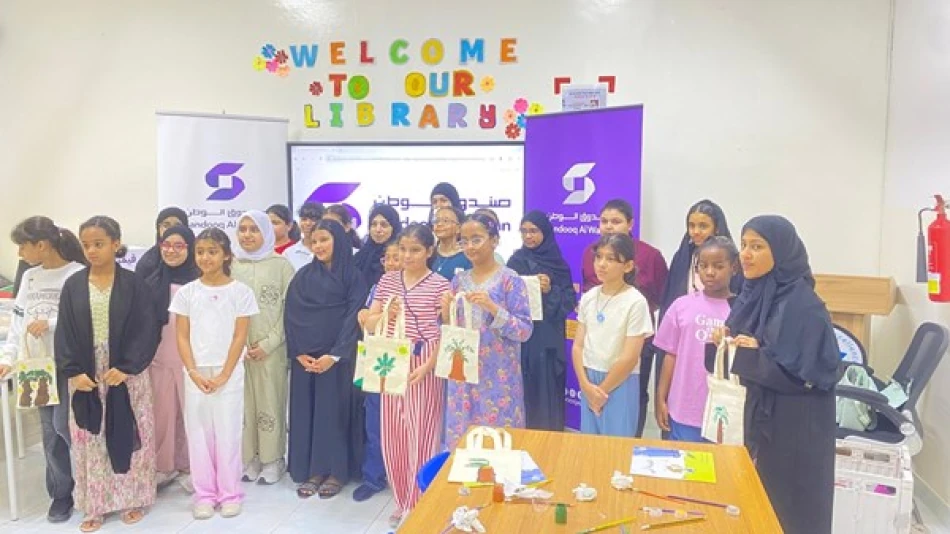
Exciting Summer Programs Finale Hosted by Watan Fund
UAE's Al Watan Fund Concludes Ambitious Summer Program, Blending Heritage with AI Innovation
The UAE's Al Watan Fund has wrapped up its fourth and final week of summer programs across 56 schools and 10 cultural and youth centers nationwide, showcasing a strategic approach to youth development that combines traditional Emirati values with cutting-edge technology. The initiative, running under the slogan "My Country is My Faith and Certainty," demonstrates how Gulf nations are investing in cultural preservation while preparing young minds for a digital future.
A Multi-Dimensional Approach to Youth Engagement
The summer programs attracted significant participation from Emirati school and university students, culminating in art exhibitions that featured traditional works alongside artificial intelligence-generated creations. This blend reflects the UAE's broader national strategy of honoring its heritage while embracing technological advancement—a balance that has become a hallmark of the country's development model.
The programming spanned cultural, national, sports, and recreational activities, with particular emphasis on Arabic language education through the "Arabic: Language of the Quran" initiative. This focus on linguistic heritage comes at a time when many Arab nations are grappling with the challenge of preserving their native languages amid increasing globalization.
Strategic Investment in National Identity
Yasser Al Qarqawi, Director General of Al Watan Fund, emphasized that the programs represent more than entertainment—they serve as a genuine opportunity to introduce new generations to authentic Emirati values and solidify national heritage. Operating under the guidance of Sheikh Nahyan bin Mubarak Al Nahyan, Minister of Tolerance and Coexistence, the fund positions itself as a translator of leadership vision into practical youth development initiatives.
Beyond Recreation: Building Future Leaders
Al Qarqawi's statements reveal a sophisticated understanding of youth development, emphasizing knowledge and skill empowerment that enables creativity across various fields. This approach mirrors successful models in Singapore and South Korea, where governments have invested heavily in comprehensive youth programs that combine cultural education with innovation training.
Preserving Traditional Arts in a Digital Age
Arabic calligrapher Said Al Ameri, who participated throughout the four-week program, highlighted the discovery of promising talents requiring support to refine their skills. His workshops focused on developing aesthetic sensibilities among students while strengthening their connection to their mother tongue's script—a particularly relevant initiative as digital communication increasingly dominates young people's literacy experiences.
The emphasis on Arabic calligraphy represents a counter-trend to the digitization of communication, suggesting that UAE leadership recognizes the importance of maintaining tactile, artistic connections to cultural heritage even as the country advances technologically.
Grassroots Success and Community Integration
Siham Maldan, activities supervisor at Abu Dhabi International School, reported strong positive student engagement, particularly with activities focusing on national identity and Arabic language. This ground-level feedback indicates that the program's theoretical objectives are translating into practical student interest—a crucial measure of success for any cultural preservation initiative.
Writer and educator Hamda Al Balushi contributed through traditional Emirati folk stories that convey values and ethics in accessible formats. This storytelling component addresses a critical gap in many modern educational systems, where moral education often lacks the cultural specificity that makes lessons memorable and personally relevant.
Cultural Programming as Soft Power Strategy
The program's theatrical component, featuring the play "The Secret of the Blue Neighborhood" at Fujairah Cultural Center, demonstrates how the UAE is leveraging cultural programming to build community engagement across age groups. This multi-generational approach suggests a long-term vision for cultural continuity that extends beyond immediate educational objectives.
The initiative reflects broader trends among Gulf Cooperation Council nations, where governments are increasingly investing in cultural programming as both a domestic cohesion strategy and a form of soft power projection. Unlike purely economic development initiatives, these cultural investments create emotional connections that can prove more durable than material incentives alone.
Implications for Regional Youth Development Models
Al Watan Fund's summer program offers a template that other regional governments may find instructive. By combining traditional cultural education with modern technological elements, the UAE is addressing the challenge of maintaining cultural authenticity while preparing youth for global competitiveness. The program's scale—spanning over 60 locations—demonstrates the kind of systematic approach necessary for meaningful cultural impact.
The initiative's success, as measured by parental approval and student engagement, suggests that comprehensive cultural programming can serve as an effective alternative to purely academic or recreational summer offerings. This model may prove particularly relevant for other nations seeking to strengthen national identity while fostering innovation among young populations.
Most Viewed News

 Layla Al Mansoori
Layla Al Mansoori






